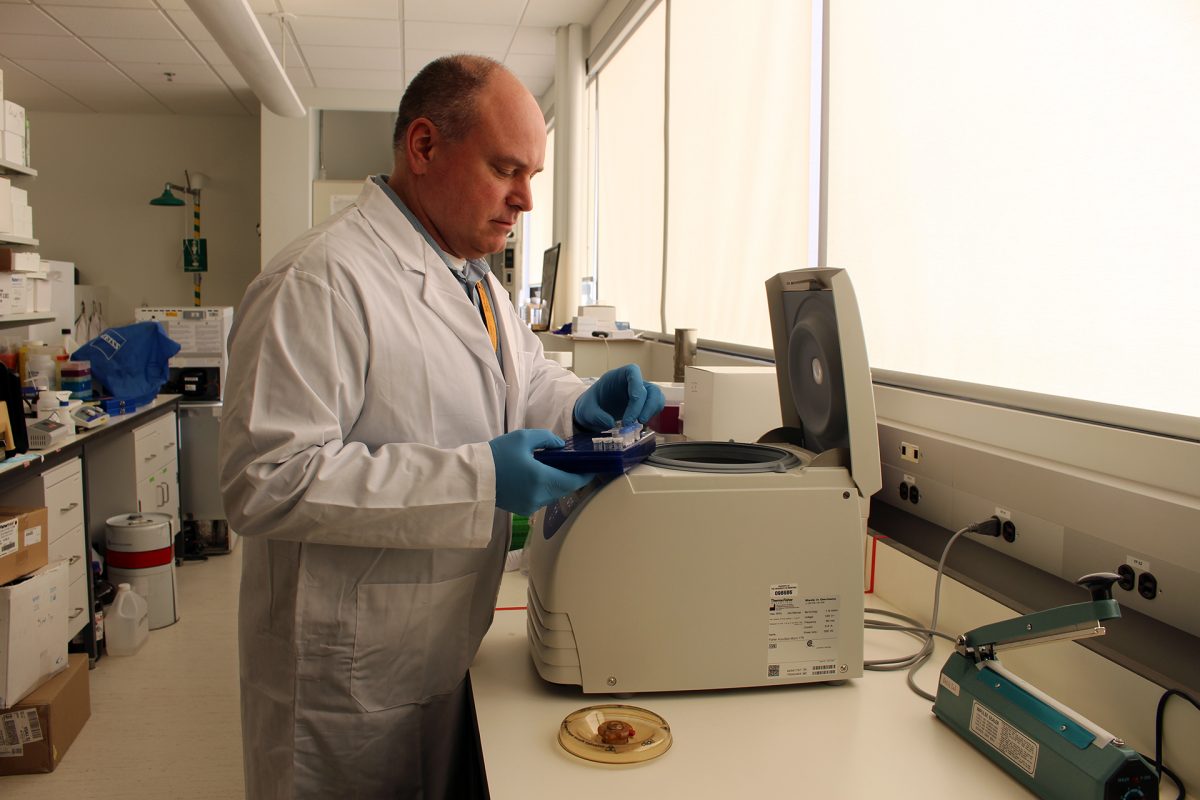
Dr. Bradley Doble is the inaugural Bihler Chair in Stem Cell Research in pediatrics, biochemistry and the regenerative medicine program.
New chair brings stem-cell expertise to U of M
For Dr. Bradley Doble, stem cell research represents a world of possibility.
“There are many different mechanisms involved in all sorts of diseases that can be studied by using stem cells. That’s why I like studying them,” he says.
Doble is the inaugural Bihler Chair in Stem Cell Research in pediatrics, biochemistry and the regenerative medicine program at the University of Manitoba, and a U of M alumnus. He started in his new position six months ago.
The chair was created from the former Bihler Professorship, which was previously held by Dr. Donna Wall. Doble’s primary appointment is with pediatrics and child health, however his position is based in the department of regenerative medicine with a cross-appointment to biochemistry and medical genetics, allowing for opportunities in interprofessional and cross-system research collaborations. The chair will have close ties to the Children’s Hospital Research Institute of Manitoba (CHRIM) and receive additional support from the Office of Research Services.
“We are very lucky to have attracted such a respected expert in stem cell biology like Brad for the new Bihler Chair,” says Dr. Geoff Hicks, director of the regenerative medicine program in the Max Rady College of Medicine. “He sees many opportunities for his research to thrive in the Regenerative Medicine Program and I am excited to see how his expertise will spark new innovative research directions with medical researchers in pediatrics and cancer.”
Previously, Doble spent 13 years at McMaster University, where he was Canada Research Chair in Stem Cell Signalling. He will continue his research here, studying a signaling pathway in pluripotent stem cells, referred to as Wnt signaling, which is a key regulator of stem cells required for the proper development of cells in the body. Pluripotent stem cells are those with the capacity to develop into any kind of body cell and renew themselves.
“The stem cells that maintain our constantly growing skin and hair and that allow tissue types like the intestinal lining and blood to replenish themselves regularly … the Wnt pathway regulates all these stem cells. But how it does this is not really well understood,” says Doble.
Since different human diseases can be broken down into stem cell defects, and the Wnt signaling pathway regulates stem cells, Doble’s research naturally converges with the study of diseases such as cancer. Understanding how the Wnt pathway works in a normal context, he says, allows researchers to see what’s going wrong in an abnormal context.
Doble will collaborate with other U of M researchers, including Dr. Tamra Werbowetski-Ogilvie, Canada Research Chair in Neuro-oncology and Human Stem Cells, associate professor of biochemistry and medical genetics and principal investigator in the regenerative medicine program. Werbowetski-Ogilvie studies medulloblastoma, a type of pediatric brain cancer.
The rapid pace of recent technological progress has advanced stem cell research exponentially and has had a huge impact on Doble’s work.
“We’re looking at the finer details of how stem cells are regulated by Wnt signaling with the new techniques available. We’re getting to the point where we can really understand a lot about what makes a stem cell a stem cell and what allows it to differentiate into different cell types,” he says.
His work with Werbowetski-Ogilivie will involve using the mass spectrometry facility at CHRIM to tag proteins of interest in cancer stem cells, identify which proteins are close to each other in a complex, and analyze how they behave. This used to be a very difficult task, but thanks to scientific advances, it has become easier and less time-intensive.
“There are all of these really cool things we’re able to do that allow us to study things in ways that would not have been possible before,” he says.
Doble’s academic career began at the U of M. He received a bachelor of science in genetics in 1992 and a PhD in physiology in 2001, conducting cardiovascular research at the St-Boniface Hospital Institute of Cardiovascular Sciences. He then switched gears to cancer research and completed his postdoctoral studies at Toronto’s Princess Margaret Cancer Centre.
Doble says a lot had changed since his time here as a student. The well-equipped, well-run affiliated research facilities including CHRIM, the Kleysen Institute for Advanced Medicine, and the Manitoba Centre for Proteomics and Systems Biology were one of his motivations for returning to U of M. Another was the impressive roster of researchers the Rady Faculty of Health Sciences has attracted in recent years.
“The timing is good to be coming back. There’s a changing of the guard and a lot of new people are coming in,” he says.
The welcoming atmosphere didn’t hurt either.
“There is definitely a ‘friendly Manitoban’ environment here,” he says.






